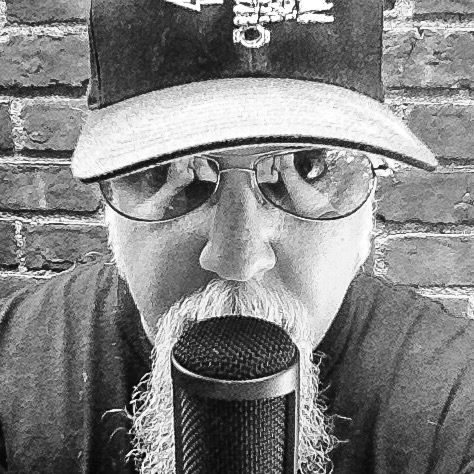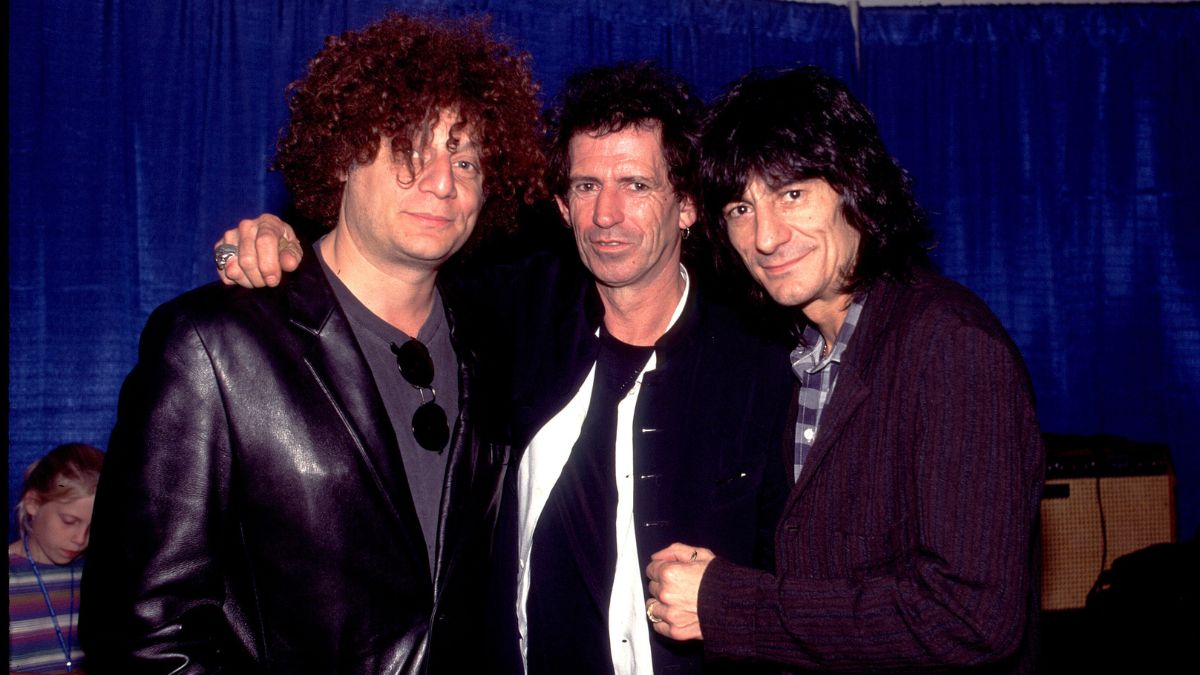"A good idea is a good idea no matter when you do it": Eddie Van Halen reveals how Van Halen brought cutting room floor jams back to life for A Different Kind of Truth
In this wide-ranging 2012 interview, EVH discusses the evolution of his onstage solo, working in the studio with Wolfgang, and the Different Kind of Truth song that "flipped" him out

The following piece is taken from the August 2012 issue of Guitar World.
On the first leg of Van Halen’s A Different Kind of Truth tour, toward the end of the band’s set, there was a moment during the middle of Eddie Van Halen’s solo spot in the show where the world seemed to stop spinning.
Even the techs, security staff and backstage production personnel would stop what they were doing to focus on the celestial sounds emanating from the stage, with huge smiles on their faces that mirrored Ed’s beatific grin as he unleashed a staggering cascade of notes. At that particular point in Ed’s solo, it was clear that there was no place in the world that they’d rather be.
These moments were all the more remarkable because, not too long ago, it seemed like they might not happen again.
The last time Guitar World spoke with Ed, in October 2009 for a co-interview with Tony Iommi, he said, “We might not record something new.” That blunt but honest statement hit fans like a ton of bricks, because it seemed like that scenario could be a likely possibility, considering that it had been five years since Van Halen released any new material and more than a decade since the band had released a full-length album.
However, as we all know now, that was not to be the case, as in February Van Halen released A Different Kind of Truth, the band’s 12th studio album and their seventh with David Lee Roth on vocals.
The most devoted old-school Van Halen fans quickly recognized several of the songs, like Beats Workin’, Big River, Bullethead, Outta Space and She’s the Woman, which dated back to demos recorded before Van Halen’s debut album.
All the latest guitar news, interviews, lessons, reviews, deals and more, direct to your inbox!
But the album also offered several new songs – like As Is, China Town, Honeybabysweetiedoll, Stay Frosty and The Trouble with Never – that kick ass as hard as anything else in Van Halen’s catalog. The album delivered an ideal balance of truly classic and genuinely new material, acknowledging the band’s past but also paving an exciting new direction for the future.
The band was eventually forced to cancel some of the numerous dates that had been packed into the Different Kind of Truth tour – as David Lee Roth explained in a video posted on YouTube, the “schedule has been sidelined for unnecessary roughness.” Fortunately, though, we had a chance to spend several days on the road with the group, especially with Ed.
Talking with him, he seems no different from the Ed we’ve always known, but his attitude is much more hopeful and optimistic. He’s certainly experienced his fair share of dark days over the past decade, from his struggles with alcohol to a recently recurring battle with cancer. But it seems like now he’s conquered those problems for good and is truly enjoying life, thanks to the dedicated support of his family and friends.
What’s truly amazing about Ed today is how he’s managed to overcome the negative elements in his life that once controlled him while at the same time relinquishing much of the control he once held over the band.
Instead of sitting alone in the driver’s seat, Ed is now allowing Wolfgang – his son, and Van Halen’s bassist – to crack the whip in the studio and during rehearsals. Without all those burdens, Ed is now free to concentrate on playing guitar, writing songs and making new gear developments.
At long last, Eddie Van Halen is back, and he’s better than ever.
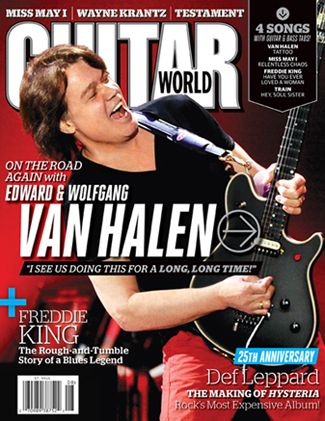
The last time we talked, you said you weren’t sure if you wanted to make a new Van Halen album. What changed your mind?
"I think I was pissed off at the time. I didn’t want to do something new because I felt that even if we did, the fans wouldn’t like it anyway. We just snapped back and realized that, hey, we’re doing this for us, too. This is what we do. We make music for a living.
"Like I’ve always said, if you like what you’re doing, you’re halfway there; if someone else likes it, that’s even better. If they don’t like it, at least you like it. Not to be selfish, but you kind of have to be."
If you like what you’re doing, you’re halfway there; if someone else likes it, that’s even better. If they don’t like it, at least you like it
What got the ball rolling on this album?
"Wolfgang’s enthusiasm. He was going, 'Come on, come on!' We went up to 5150 and started jamming. It felt like a comfortable old pair of shoes. Working with Dave again was like we had never left each other. It was that comfortable. We’ve known each other since high school. When you have old friends, five or six years can go by when you don’t see each other, but you just pick up where you left off.
"We started recording at the studio at my house with just Alex, Wolfgang and me. Basically it’s the same way we start any record. We went through our archives of stuff we had already written. Wolfgang picked out a bunch of tunes.
"She’s the Woman was the first one. We started jamming on songs like She’s the Woman and Bullethead and reworked them. Dave was onboard from the beginning.
"I was already recording and engineering demos of She’s the Woman, Bullethead and Let’s Get Rockin’, which is now Outta Space. I sent Pro Tools files of recordings over to Dave, who was working over at Henson Studios, where he likes to record, which got him totally excited. He said, 'Let’s get going!'"
How did you choose John Shanks to produce the album?
"The most difficult part of the process was deciding whether or not we should use a producer and who we should use. We had a big list of producers. Ever since we did that interview together with Tony Iommi, I’ve been in contact with Tony a lot.
"Sabbath is doing their reunion also, and they’re working with Rick Rubin. I don’t think Rick is the right producer for the kind of band that Van Halen is, but his name was in the hat. So was Pat Leonard. Dave doesn’t have a home studio, so he goes down to Henson to record, write and keep his voice in shape.
"One day he told me that he ran into this guy named John Shanks. I thought he was an odd choice, but we were open to anything. John asked what we had. I played him our three demos, and he loved them.
"It was actually Wolf’s idea for the album to be a collection of our B-sides along with three reworked songs, which would be new to our audience. Instead of the 'Best Of' it would be the 'B’s Of' – you know, songs like Drop Dead Legs, Girl Gone Bad…
"It would be a record of our more hardcore songs and none of the pop stuff. That was the initial plan for this album, but the deeper we dug, the more we found. At the same time I was writing new songs. Dave got very excited about that. We all did. We ended up recording demos for 35 songs. All of those songs were ready to go, and we were able to play them all.
"We called John again and asked, 'Are you busy? Do you want to come up and take a listen?' He was like, 'Whoa! You’ve got a shitload of songs here!' We pretty much left it to John and Wolfgang to pick the songs, and it all went from there."
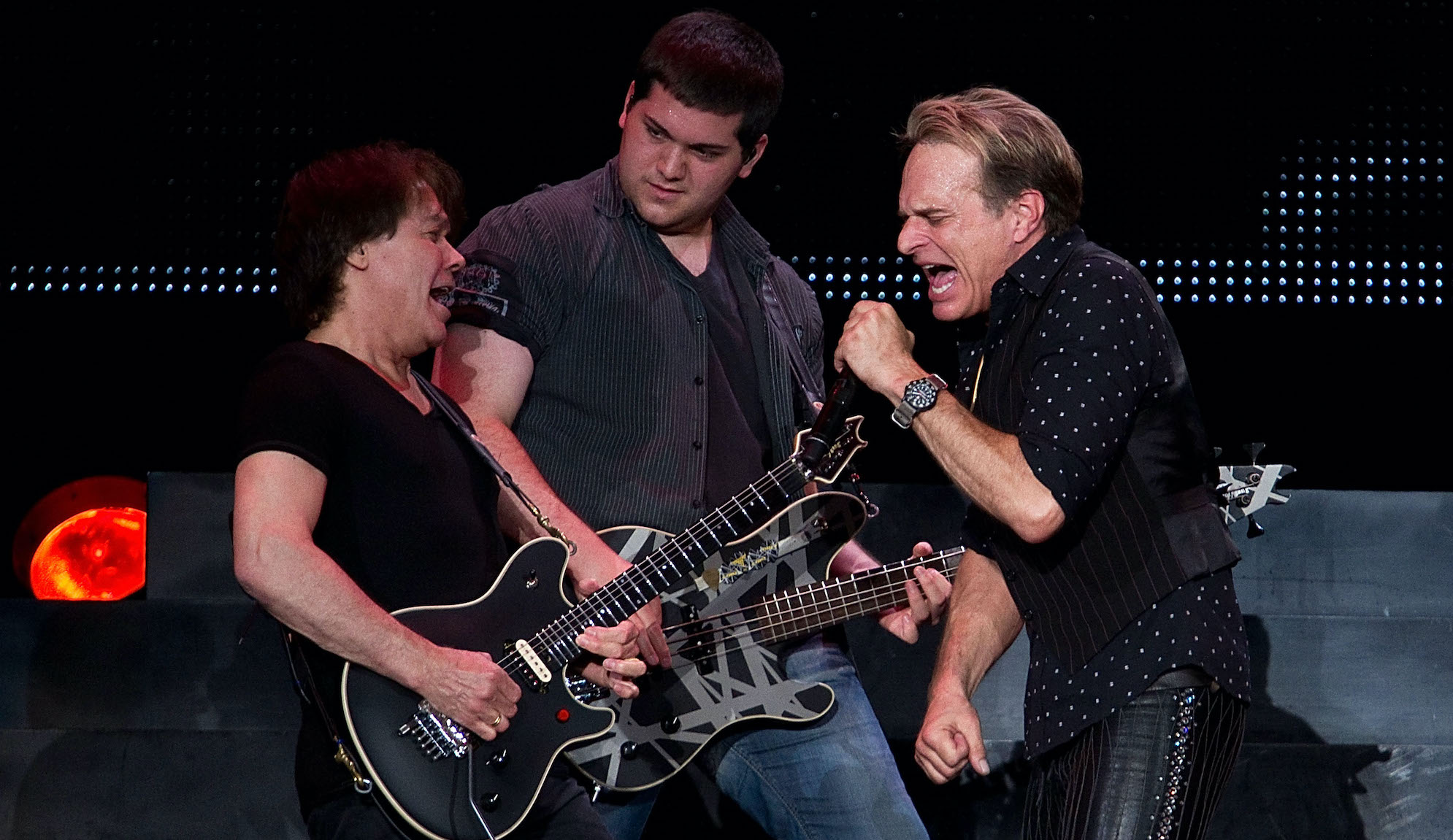
For the new album, Wolfgang pulled out some songs from the band’s past, which is something the group had done for previous records. For example, on Fair Warning, the band were still drawing on material like Mean Street/Voodoo Queen, which were from the demos you recorded before the first album came out.
"We were doing things like that even later. Seventh Seal [from Balance] is a song that I wrote before Van Halen was even a band. Hang ’Em High [from Diver Down] was written long before we put it on an album. Same with House of Pain [from 1984], which was also on the demos we recorded in 1976 with Gene Simmons.
"We approached this record no different than any other. The internet has changed everything. Now everyone knows where things came from. Before the internet nobody would have known that these were songs that we had already written but never released.
A good idea is a good idea no matter when you do it
"When the album first came out, some people were saying that we purposely did old songs to get the public to relate to our old sound. But this record wasn’t planned that way. Whenever we make a record the first thing we do is go over what we already have in the bag that we can pick from, and then we focus on writing new material.
"When we were digging around, I was amazed how fresh some of the songs sounded. I was going, 'Did I really write that way back then?' The biggest trip is that I wrote some of those songs when I was still in high school and even junior high. A good idea is a good idea no matter when you do it."
5150 has been like a second home to you for decades now. How did it feel to work in a different studio?
"It was a pleasant experience, but I missed working at home. I’m used to the monitors at 5150. After we worked at Henson we had to redo all of the guitars and all of the bass at 5150 because I couldn’t hear them at Henson the way I’m used to. It was the same thing when Ross Hogarth did the mixing. He tried to do it at Henson, but he couldn’t hear things properly either, so we mixed at 5150 also.
"The process of making the record was very simple. It took us maybe three weeks to lay down all the instrumental tracks. We played live and we were super rehearsed. We made a few nips and tucks here and there, but everything was pretty much there.
"Part of the problem at Henson was that they were running everything through this CLASP tape system in addition to Pro Tools. With CLASP, the tape machine just keeps going and rewinding to give you that analog sound, but I don’t ever remember seeing anyone align or clean the heads on the tape machine once.
"Everything ended up sounding like it had a sock over it. When I took it home to listen to it, I went, 'There is something very wrong here.' Al, Dave and Wolfgang came up to 5150 and agreed that we had a problem."
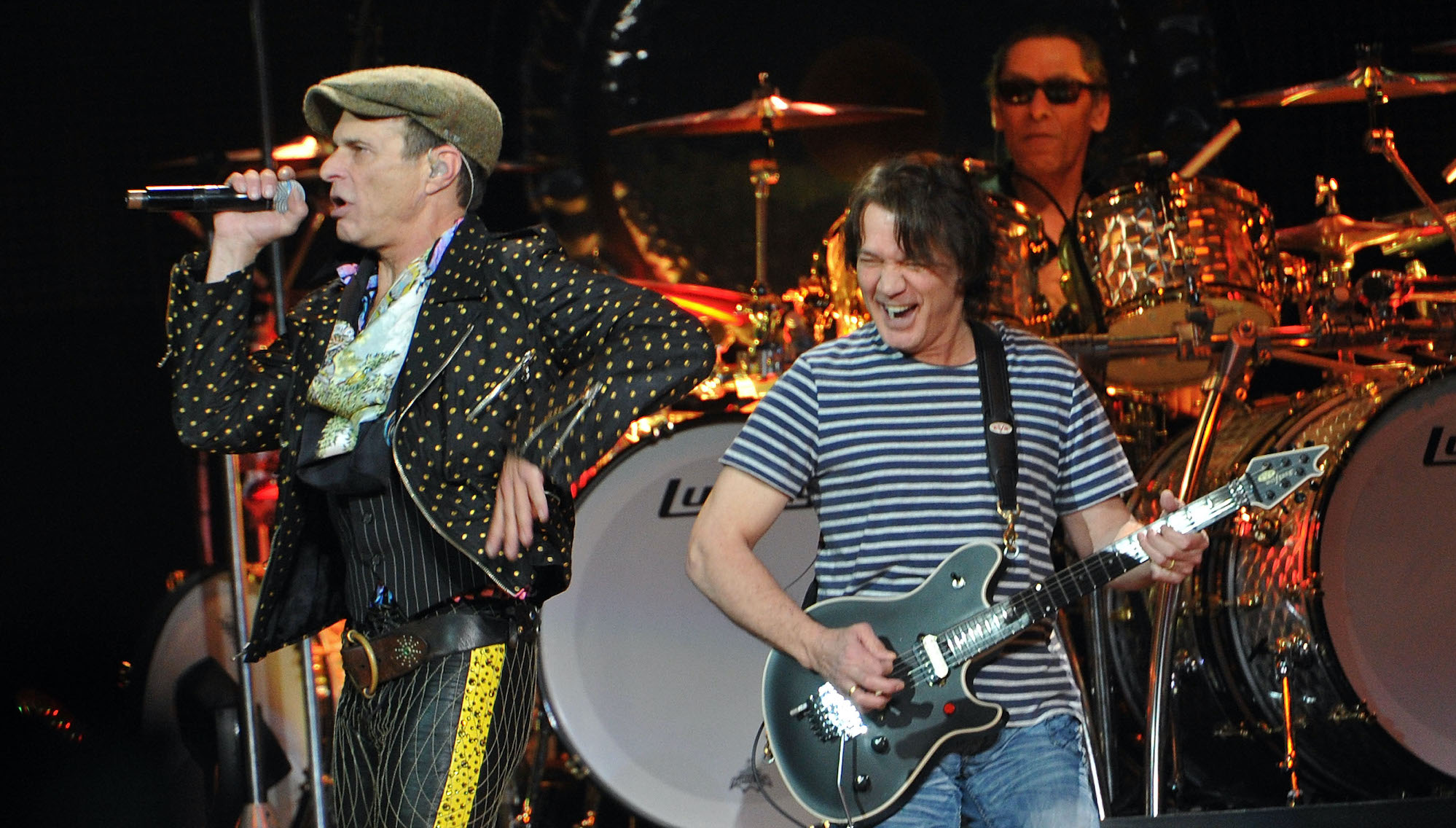
How did Wolfgang adapt to working in a different studio?
"It was great to watch him work in an actual professional recording studio, with a producer, actually making a record, which was different than watching him work at 5150. He took the bull by the horns. He had a lot to say. I was shocked by all the great ideas he had, and he was very opinionated.
"He came up with the arrangement for Stay Frosty. When Dave wrote it, it was just an acoustic thing like it is on the intro. Wolf turned it into what it is. It was interesting to watch, especially John’s take on it. I think he was actually a bit intimidated by a 20-year-old kid telling him how things should go. We already knew about song structure, so basically all we needed was an outside opinion or an outside ear.
"I think he’s used to making records where he has to do pretty much everything for the young artists he produces, which is why I initially thought he was an oddball choice. Wolf threw John a major knuckle curveball. It shocked him, so I think he tried to lean toward working with me, but I said, 'He’s a member of the band. You’ve got to deal with him too.'
"When I played my solos, I’d walk out of the room and let Wolf and John pick the best take. Sometimes I’d hear him arguing with John, which was funny. It was neat to watch Wolfgang stand up for what he believed in and thought was right. He’d tell John which part he thought was better, and John would sit there and go, 'Okay.'
"John is a great guy. We weren’t there the whole time he was working with Dave, because Dave prefers to work at night and we like to start working at noon. These days I wake up at six in the morning. If we start working at night, I’m ready to go to sleep. We weren’t there when a lot of the lead vocals were being recorded, but I think Dave and John did a great job."
It must be a relief for you to be able to relinquish some of the control over the band to Wolfgang. In the past you were almost entirely responsible for that role.
"It was a relief in a lot of ways, especially since this was the first record that I’ve ever made being sober, and I was nervous. I was glad Wolfgang wanted to do that. I said, 'Go ahead!' I was as nervous as a motherfucker. Why? God only knows. I still get nervous every night before I go out onstage. It keeps you on your toes."
On this tour you’ve changed things up quite a bit by bringing out some deep cuts that you haven’t played for a while and changing the set list around.
"That’s Wolf too. He’s in charge of the set list every night."
You haven’t played some of those songs for 28 years or more. Did you have trouble remembering them?
"That’s why we do soundcheck every night. The next couple of songs that we’re trying to work in are Light Up the Sky and As Is. We’ll figure out the right time to do them. It’s fun.
"We played Hang ’Em High for the first time during soundcheck. That song is wicked. It has so many changes, there is so much shit going on, and it’s fast. If you slip up once the whole song is fucked. After we did it, we were all looking at each other and going, 'What do you think guys? Should we take a chance?' And it was Dave of all people who said, 'Fuck yeah! Let’s go out there and do it.'
"I thought he was going to say no. He said, 'What’s the worst thing that could happen?' We played it great."
Your playing is as good as, if not better than, it has ever been. Did the hand surgery and arthritis treatment you had back in 2009 help with that?
"Definitely, but what I think helped more is that my head is clearer. I’m aware of what I’m doing now. It’s amazing that I ever did it any other way, to tell you the truth.
"Looking back now, I don’t see how I did it for all those years. I could not imagine going back. At the same time, I’m up there playing so I can only go by what Matt [Bruck, Ed’s guitar tech, road manager and jack-of-all-trades] tells me. When I’m up there playing I can’t tell.
"I know that my playing is a lot more consistent. It’s like all the little neurons are more connected. The beauty of doing my solo now is that I get to sit down. I was just talking with [Eddie’s wife] Janie the other day about how the reviews mention that I sit down to do my solo like I’m sitting on my front porch or couch playing for people.
"Believe it or not, I can sit there and play like that all night long. It’s harder for me to play when I’m standing up. When I sit down I can really play. It’s a gas! I’m having fun. Sometimes a solo goes by so quickly and the next thing I know it’s over. I don’t mix it up too much. I used to noodle so much, but now it’s more mapped out.
"I know that people want to hear certain things, so I do the beginning and end of Eruption, a bit of Cathedral and Spanish Fly in the middle, and a few transition parts to piece everything together. I don’t remember what I did at the last gig, but Dave walked up to me afterward and said, 'Whatever you did in your solo tonight was different. It was great!' But it happened so fast with me that I don’t know what I did that was different.
"Sometimes Matt will say the same thing, and I’ll think that I played the same thing I always do."
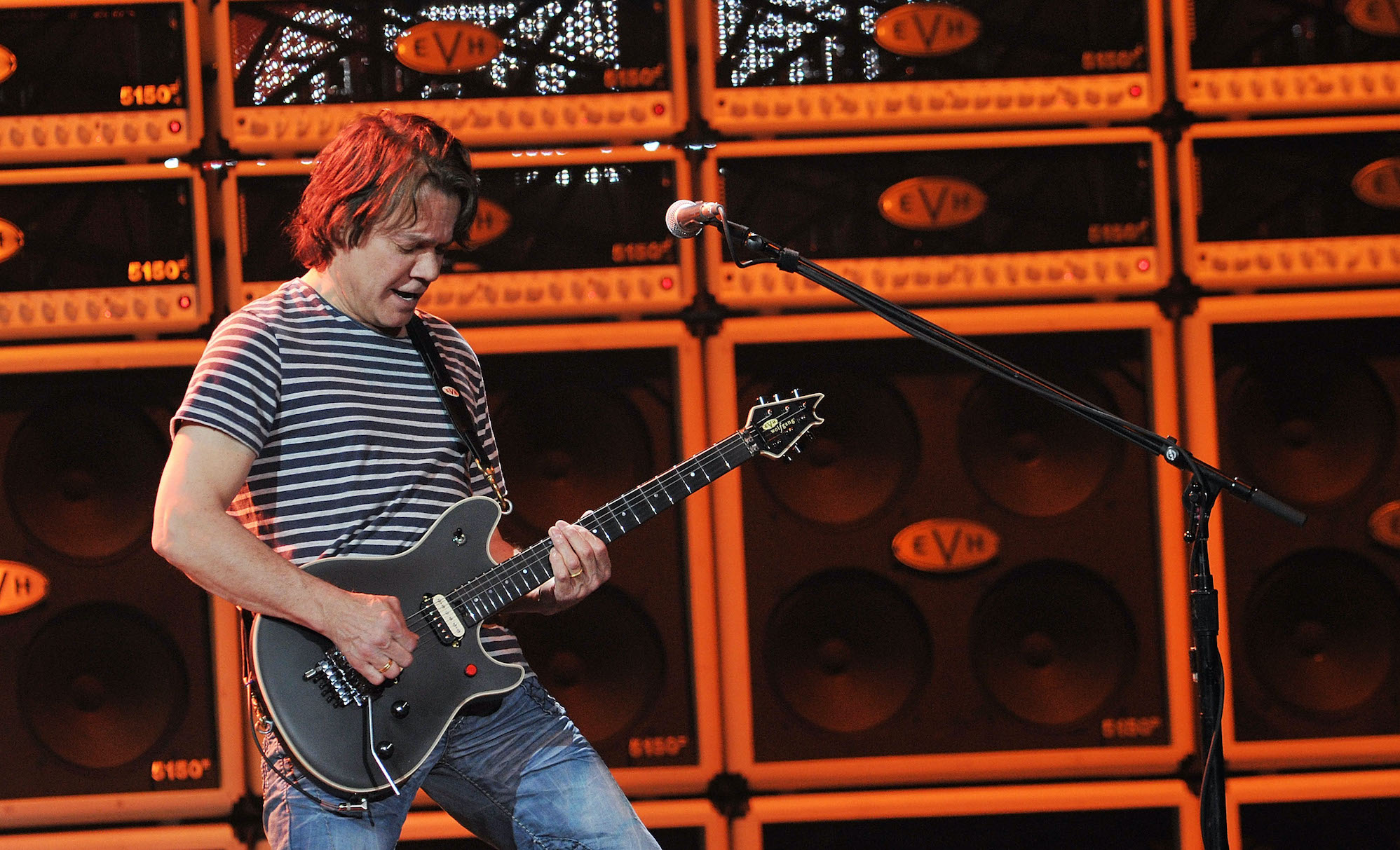
Your tone is so clear. That’s probably because your fingers are like clamps on the strings.
"I dig in with both hands. That’s why my thumb is like this [holds up right hand to show thumb, which is bent back toward his wrist]. About 20 minutes before this one show, I was backstage and I walked past a tapestry that was covering the door frame. I whacked my hand against the doorjamb, and it swelled up really badly.
"I was able to make it through the show, but the next day I went to have an X-ray taken of my hand to make sure there were no hairline fractures or anything. The radiologist went, 'Man! What’s wrong with your thumb!' I said, 'Nothing. It’s this part of my hand that I hit.' He said, 'Your thumb is all fucked up. It’s not supposed to bend back that far.' It’s from years of digging in with the pick. [laughs]
"It’s an occupational hazard. My thumb won’t bend the other way. Before the operation on my left hand I wasn’t able to stretch my fingers open all the way. I’ve never had very big hands, but I could do the splits with them. Eventually I couldn’t any more. I had a twisted tendon in my little finger that prevented me from being able to stretch. It would fucking hurt when I was playing.
"You can still feel the twist. When I flex the tendon it feels like it’s snapping, but now I can stretch all the way again. If it hurts I just take a couple Advil instead of a couple shots of vodka."
Was the EVH Wolfgang Stealth that you’re playing onstage also your main guitar on the album?
"I used it for everything except As Is, where I used a D2H 'Drop 2 Hell' guitar. The solo and some overdubs on You and Your Blues were a Strat. It just happened to be lying there and John went, 'Here, try this!' The rest was the Stealth. I even played the whole record on the same set of strings with the exception of two strings that broke and were replaced.
"I’ll always leave the same set of strings on my guitars when I’m recording. If I break one I’ll just replace it instead of putting on a whole new set of strings."
After all of these years of playing maple fretboards you now prefer a guitar with an ebony fretboard. How did that develop?
"I’m constantly changing and evolving. I thought that the Stealth, with its flat-black finish, wasn’t going to look good with a maple fretboard. I just threw out the suggestion to use an ebony fingerboard. When the guitar arrived, I started playing it, and I really liked it."
Did you use the 50-watt EVH 5150 III on any songs?
"All of the guitars on Tattoo were played through the 50-watt. I used a 2x12 cabinet too. It’s really whomping. I also used it on the solo on Blood and Fire. It has a slightly different tone."
You’re using a lot more wah on your solos on this record.
"Yeah, I noticed that too when we were done. I said, 'I’m using an awful lot of wah on this record.' The Trouble with Never was designed to be kind of Hendrix-ish, so using wah on that was a given. On other spots I just stomped on it and went, 'Oh great. That works.'
"There wasn’t a whole lot of thought given to that. You know me. I’m the kind of guy who likes to wing it. I don’t plan out my solos. The one solo that I had to plan out was on She’s the Woman. The original breakdown of She’s the Woman ended up being the breakdown in Mean Street. Wolfgang came up with a new breakdown that had these crazy chord changes.
"The chord changes were so fuckin’ weird, but I didn’t even think about them until I had to solo over it. I couldn’t just go…[plays random notes in a pentatonic scale]. It wouldn’t be in key. Instead I had to go like this…[plays melodic line from solo]. I never really worked out a solo like that before. It took me a couple of days to figure out what notes worked against those chords. If I don’t hit these particular notes [plays solo] it wouldn’t work.
"It flipped me out. When we did the demo, Matt punched me in, and I just sat there going, 'Goddamn. This doesn’t work!' [laughs] You can’t just noodle your way through those chord changes. You have to hit the right notes. The only thing I ever really planned before was the solo in Runnin’ with the Devil. Other than that, nothing else was planned or written out in advance."
Blood and Fire used to be Ripley, which you originally recorded with a Ripley stereo guitar. Did you break out the Ripley guitar again to record the new version?
"Oh yeah, but I had to send it back to Steve Ripley to have him fix a couple of the panning pots, since I hadn’t used it in quite a few years. Even before the first note is played, you can feel this huge presence at the beginning of the song, where it seems like you’re sitting in the room with a very loud amp.
"It’s actually two big, loud amps, since I was playing in stereo. The single-coil pickups – there are two of them because it’s in stereo – had something to do with that. It’s a hell of a sound. In the room it was really loud. The Ripley guitar sounds different than a Strat. It has Bartolini pickups and a proprietary circuit, so you have a lot of unique things going on there. Put that all together and you’re not going to sound like a Strat."
You used a whammy pedal on several songs.
"It’s on China Town. A lot of people thought that I used a harmonizer or octave box on the intro to that song, but that is just Wolfgang and me. The Whammy is just for little parts here and there during the chorus. I don’t use it live. I just hit a harmonic instead.
"On Honeybabysweetiedoll I used a Whammy, a Boss OC-3 octave box, a Sustainer and a Line 6 DL4 Delay Modeler. That’s only on the intro, where all those weird noises are happening."
The legato lines you play with the sustainer have a very Middle Eastern sound.
"That was the point. I love that song. We have some other versions of that song that are really twisted. The main riff on the intro is all Wolf; it’s all bass. I’m just making noises. Up at 5150 when Wolf unplugged his bass, it picked up all these radio frequencies. You hear this whooshing sound until he plugs it in. I’m doing the high, cascading whistling shit; he’s tapping the main riff.
"The end of the song is him unplugging his bass. If you give that a good listen you can hear all kinds of weird shit going on. I also used the Sustainer on the end of As Is."
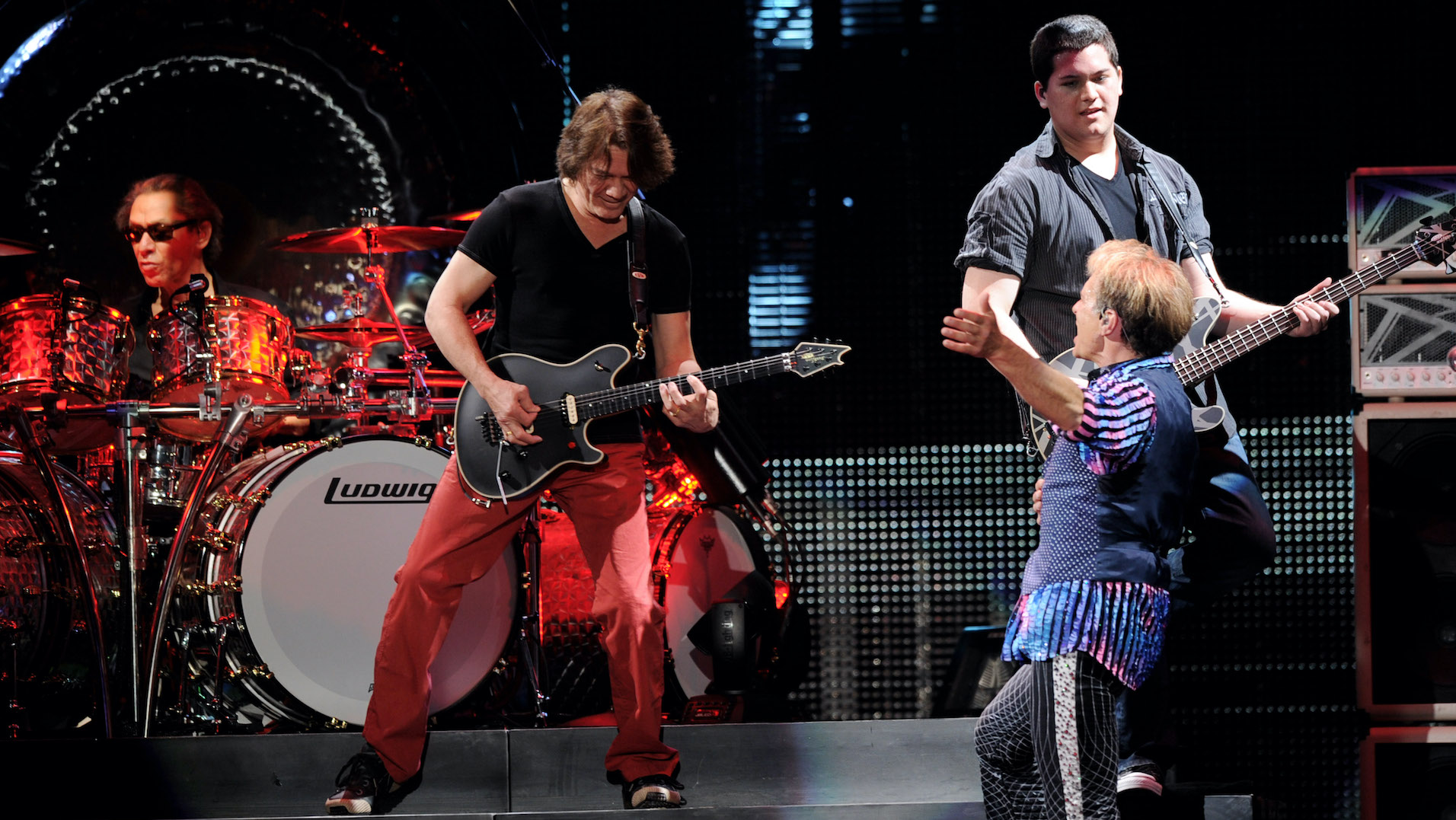
You brought out the Phase 90 for the solos on Outta Space and Stay Frosty. Was that to replicate the classic early Van Halen sound?
"It’s very straight ahead. I wanted to stay true to the original version. Dave’s guitar playing often gets overlooked. He’s really good at fingerpicked, country-style blues like he plays on the intro to Stay Frosty."
Yes! He is great.
"He played guitar on that song up until the band came in, and then I took over on acoustic. He played that on a nylon-string flamenco guitar. It’s an interesting sound. But he can really fingerpick! Even on our first album, a lot of people thought that I played the intro to Ice Cream Man but that was Dave.
"His lyrics on the album are full of wit and personality with a lot of street wisdom. Some of his lyrics are hilarious. Dave’s good. He’s a very well-read person, and it shows in his lyrics. I don’t know of anybody else who can write lyrics that are so out there. Some of the stuff is blatant, but a lot of it makes you think. It’s tripped-out and deep, but not so deep that you can’t relate to it. I think he’s brilliant."
Considering the reception to the album and the tour, and the fact that you recorded so many songs, it seems like there’s good motivation to continue moving forward for a while.
"Oh yeah. As far as I know, when we’re done with this cycle we’ll take a little break and make another record. That’s what I hope to do. I’m pretty sure that’s what our intention is. We truly are a band; it’s not just a one-off thing. I don’t want to say it’s a rebuilding process. If anything it’s a continuation. It feels more like a band and a family than it ever has, and not just because three quarters of it is family.
"Working with Dave has been very productive. We’re all very opinionated about things, but it’s all for the benefit of the music. We’re working together better than ever. I see us doing this for a long, long time. When things feel right, why the hell not keep doing it?"
I think being older and wiser, you’re no longer concerned with all of the distractions that took your focus away from the music.
"I was just thinking about that before you got here, because I had the feeling that you’d ask me what’s different now than it used to be. I think I finally put my finger on it. It wasn’t really us; it was people around us. When you’re doing drugs, drinking and partying, you start believing the shit people tell you. Those days are gone. We’ve gotten rid of people who don’t belong here. Now it’s truly just the band.
"We have no problems with each other at all. We’re here to do a job, and we love doing our job."
You seem to be genuinely happy now. You went through quite a dark period for a while, and we were worried about you.
"So was I. But I can’t think of anyone on the planet who is more lucky and blessed. Not only do I get to play with my brother but I also get to play with my son. If my dad was still here now that would really make things amazing. I have a wonderful wife, wonderful friends, and a son who doesn’t smoke, drink or do drugs. I’m just a guitarist in a kick-ass rock and roll band. What more could I ask for?"
Chris is the co-author of Eruption - Conversations with Eddie Van Halen. He is a 40-year music industry veteran who started at Boardwalk Entertainment (Joan Jett, Night Ranger) and Roland US before becoming a guitar journalist in 1991. He has interviewed more than 600 artists, written more than 1,400 product reviews and contributed to Jeff Beck’s Beck 01: Hot Rods and Rock & Roll and Eric Clapton’s Six String Stories.
